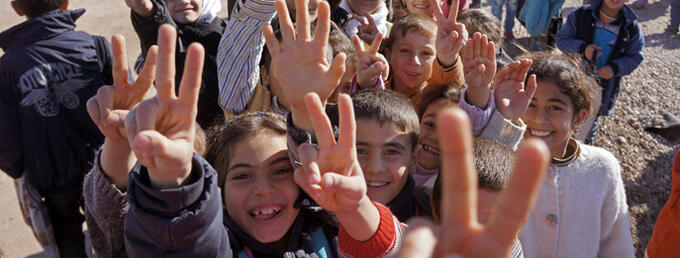ANKARA, Turkey—"I came here to listen” said United Nations Secretary-General Ban Ki-Moon in Islahiye refugee camp in Turkey today, “but I must say the massacre in Syria should be stopped. The violence in Syria is causing dramatic increase in the number of refugees.”
Despite the rain and cold, the Secretary-General greeted Syrian families in their temporary shelters. UNFPA’s Programme Division Director, Mabingue Ngom, and Representative in Turkey, Zahidul Huque, also welcomed the Secretary-General at one of the health facilities supported by the Fund.
Of the 460,000 Syrian refugees in neighbouring countries, over 135,000 are staying in 14 camps in Turkey. All the camps are managed by the Turkish Government, which has provided nearly all needed aid to the refugees. At the request of the government, the UN involvement in the camps has so far been limited.
Turkish Government has been providing health care and food
“The government has done remarkable work in responding to the needs of the refugees,” says Mr. Huque, “but the camps are reaching their full capacity and services are becoming overstretched.” Indeed, as the conflict in Syria continues and winter approaches, the number of refugees in Turkey is expected to reach 230,000.
The Turkish Government has provided the refugees with free health care and food assistance through a sophisticated electronic voucher system. For example, each Syrian family has received an electronic food e-card loaded with the equivalent of $45 per family member per month, enough to provide 2,100 calories per person per day.
Additional help is needed
“But it’s time for the international community to step in,” says Mr. Huque. “The government has been very cooperative with UNFPA, and they have appreciated our work so far. But we need to work on the different issues identified during our recent health missions, notably regarding psychosocial support and family planning.”
UNFPA has so far distributed 20,000 hygiene kits ( including sanitary napkins, soap, toothbrushes and toothpaste among other items) to the Turkish Red Crescent through an agreement with the Prime Minister’s office on Disaster Management. UNFPA expects to distribute another 20,000 kits in the coming months. Moreover, 36 staff of the Ministry of Health, who are working in the camps, have been trained by UNFPA in the Minimum Initial Service Package (MISP) on reproductive health, an established set of priority activities to be taken in a coordinated manner by medical personnel during the onset of an emergency situation.
Advocating for the needs of gender-based violence survivors
During a recent assessment mission led by WHO, UNFPA staff noticed that psychosocial support was not provided to refugees and that gender-based violence was not considered as a significant concern by health providers.
However, according to UNFPA’s partners, there have been reports of widespread sexual violence within Syria, which has been a major cause for displacement. “Services to address the needs of GBV survivors within Syria and in refugee camps must be strengthened,” says Mr. Ngom, “and communities ought to be mobilized to prevent the perpetration of additional violence.”
Sexual violence often escalates in times of conflict
Conflict exacerbates the gender inequalities and abuses of power that can lead to sexual violence, which is often used as a tactic of warfare, whether randomly, opportunistically or systematically.
However, sexual violence is a sensitive issue and remains taboo amongst most communities. For these reasons, it is often difficult for women to speak out and thus for service providers to identify such cases. It is therefore crucial that the confidentiality of survivors is prioritized to minimize the risks for women and girls, their families and those who are trying to help them.
Given the stigma and potential risks associated with reporting cases of gender-based violence and the limited availability of services, efforts to increase support for prevention and response should not be contingent on the reported cases. “Any efforts to collect data on GBV must be guided by international standards to prevent causing unintended harm,” says Mr. Ngom.


